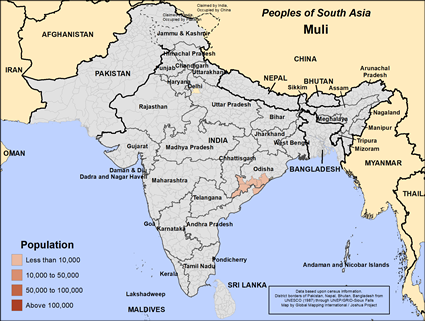Muli in India

Send Joshua Project a photo
of this people group. |

Map Source:
People Group data: Omid. Map geography: UNESCO / GMI. Map Design: Joshua Project
|
| People Name: | Muli |
| Country: | India |
| 10/40 Window: | Yes |
| Population: | 19,000 |
| World Population: | 19,000 |
| Primary Language: | Telugu |
| Primary Religion: | Hinduism |
| Christian Adherents: | 0.00 % |
| Evangelicals: | 0.00 % |
| Scripture: | Complete Bible |
| Ministry Resources: | Yes |
| Jesus Film: | Yes |
| Audio Recordings: | Yes |
| People Cluster: | South Asia Hindu - other |
| Affinity Bloc: | South Asian Peoples |
| Progress Level: |
|
Introduction / History
The Hindu Muli people reside in the eastern Indian state of Odisha. Historically, they have engaged in agriculture and labor-intensive work, often relying on the region's natural resources to sustain their livelihoods. Over time, many Muli families have maintained these traditional occupations, though some have diversified into other forms of labor as economic opportunities have evolved in the region.
What Are Their Lives Like?
The Muli people primarily engage in farming, growing crops such as rice, maize and pulses which are well-suited to Odisha's climate. Many families also work as laborers in construction or other industries to supplement their agricultural income. Life in their villages revolves around farming cycles, with family members collaborating in the fields and in household tasks.
Their villages typically consist of modest homes made from locally available materials like mud, brick and thatch. Extended families often live close to one another, fostering strong communal ties. Although some younger members seek work in nearby towns or cities, most Muli families remain in rural areas, depending on agriculture for their livelihood.
What Are Their Beliefs?
The Muli people practice Hinduism and participate in religious observances closely tied to the agricultural calendar. They worship deities such as Vishnu, Shiva and Durga and observe major Hindu festivals like Diwali, Holi and Rath Yatra. Local gods and goddesses, particularly those believed to influence the success of their crops and livestock, are also venerated in the community.
Temples and shrines play a central role in their religious life, providing a space for community worship and festivals. Religious leaders guide the community in conducting rituals, offering prayers for good harvests, and seeking protection from natural calamities.
What Are Their Needs?
The Muli people face challenges related to economic development, education and healthcare. Many families still rely on traditional farming methods, leaving them vulnerable to environmental changes like droughts and floods. Access to modern farming techniques, irrigation systems and sustainable agricultural practices would help improve crop yields and secure their livelihoods.
Education is another significant need in Muli communities. While some children attend local schools, the quality of education often remains low, limiting their opportunities for further education and employment. Expanding access to quality schooling would provide greater economic mobility for the younger generation.
Healthcare services are also limited, with many families traveling long distances to receive medical care. Improving healthcare infrastructure and ensuring better access to medical services would enhance the overall well-being of the Muli people.
Prayer Points
Pray for the Holy Spirit to show himself far more powerful than any other spirit.
Pray for signs and wonders to take place and that this would testify of the power and authority of the name of Jesus.
Pray for wisdom in discipleship with rapid multiplication of disciples and house churches.
Pray for bold, compassionate workers to be sent to them.
Pray for revival to spread through Muli communities, transforming them by the love of Christ.